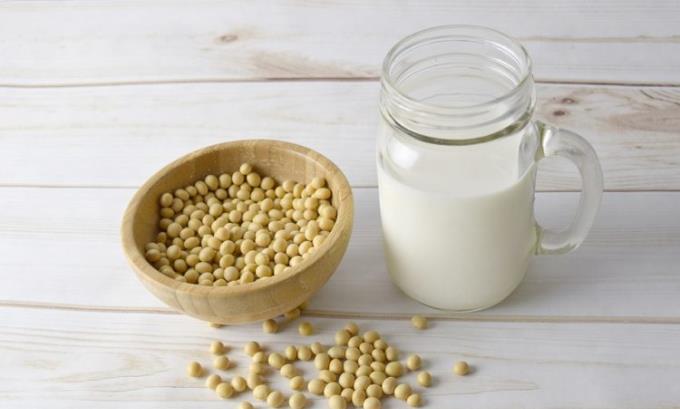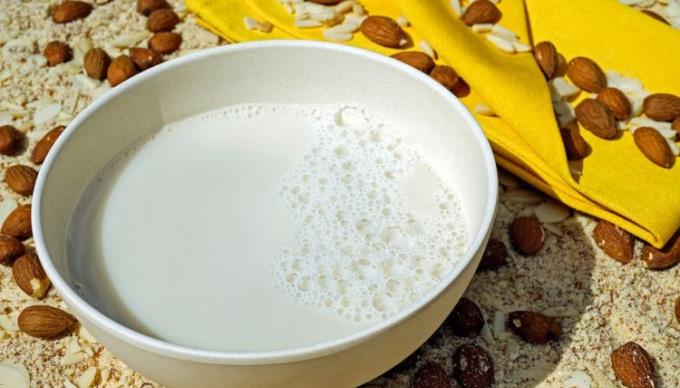Milk for pregnant women is an indispensable nutritional drink for women during pregnancy. However, which type of milk is really good for the fetus, suitable for pregnant mothers and how much milk should be consumed each day to keep mothers healthy and developing well is important.
Pregnancy is a time when you will go through countless wonderful changes with many different levels of emotions. So, from exercise to diet, everything has to be careful. In particular, the issue of how much milk a pregnant woman should use in order to be good for both mother and baby is concerned by many people. If you have this same question, follow the following aFamilyToday Health article .
What are the benefits of milk for pregnant women?
Milk is a great source of calcium and other minerals that are important during pregnancy. Pregnant women need about 1,000 - 1,300mg calcium / day. In addition to calcium and mineral supplements for the body, drinking milk during pregnancy is also very beneficial for the baby's development in the first years of life. Those benefits include:
If you drink a lot of milk, when born, your baby will weigh more and grow faster than other babies.
The mother elected to drink a lot of milk during pregnancy also gives the baby many benefits in adulthood. These babies will have high insulin levels when they reach middle age, thus reducing their risk of type 2 diabetes .
In addition, pregnant mothers drink milk during pregnancy also help reduce the risk of osteoporosis in the future. Besides, it also reduces the risk of rickets in babies because milk is rich in vitamin D. Moreover, drinking more milk also helps your baby to have a high IQ.
More importantly, milk is also an excellent antacid , helping to reduce heartburn and stomach problems during pregnancy. Milk also helps keep the body moist and replenishes lost water.
In particular, drinking milk also helps reduce the risk of polycystic sclerosis in pregnant women .
What type of milk is good for pregnant women?
Currently, on the market there are many different types of milk for pregnant women. Finding the right milk for you is not easy. If you are worried about which type of milk to buy, please follow the following shares:
1. Fresh milk without skim fat for pregnant women is an option for pregnant women to lose weight during pregnancy
If you don't want to gain too much weight during pregnancy, skim milk (skimmed milk) is a good choice. As the name implies, skim milk is milk that has largely removed the saturated fat, making it less fat. This milk is still full of protein, vitamins and minerals like whole milk. However, some essential fat-soluble vitamins like A, D, E and C may be partially reduced.
One cup of skim milk contains about 305mg of calcium and 83 calories. You should drink 2-3 cups per day to provide enough calcium that your body needs.
If you have health problems and want to lose weight during pregnancy, please refer to the article 9 safe ways to lose weight during pregnancy to update useful information.
2. Full cream milk full of nutrients
Whole milk contains all the necessary nutrients for pregnant women. However, it has a fat content of about 3.5%. This may not be a good choice to drink every day as it is very fatty. One cup of whole milk contains about 5 grams of saturated fat and 149 calories.
3. Pasteurized milk can be dangerous for pregnant women
Pasteurized milk is milk that is heated to a certain temperature and cooled. Pasteurization only slows the growth of bacteria in milk, not completely kills. Therefore, these types of milk can be dangerous to pregnant women and their unborn babies because they can contain bacteria that cause serious infections. Pregnant women should avoid all unpasteurized dairy products.
4. Is fresh milk good for pregnant women?
Drinking milk or eating pasteurized dairy products is safe for pregnant women. During the sterilization process, pathogenic bacteria will be destroyed at high temperatures. If drinking raw milk has not gone through any sterilization and pasteurization process, it is very easy to get a number of diseases, because this milk contains a lot of bacteria, the most common being Listeria monocytogenes . Therefore, unpasteurized fresh milk is considered unsafe for pregnant women. Consuming unpasteurized raw milk makes you more susceptible to infections and can seriously threaten your baby's health.
Types of milk for pregnant women
1. Cow's milk is good milk for the development of the fetus
Cow's milk is the most popular and widely used milk. You can use cow's milk as whole milk, skim milk or flavored milk.
Nutrition Facts: Cow's milk contains a lot of amino acids that help build cells for the mother and baby's body. Vitamin D in cow's milk helps prevent diabetes in the mother and also helps the development of the fetus. Vitamin E acts as an antioxidant, preventing diseases. If you want stronger bones, drink plenty of cow's milk as cow's milk is very high in calcium. One cup of cow's milk provides about 285mg of calcium. Cow's milk also contains vitamin A which is good for eyesight and helps boost the immune system.
2. Goat's milk supports metabolism and digestion for pregnant women
The smell of goat's milk may make you dislike, but the benefits it can provide are many.
Nutrition Facts: Compared with cow's milk, goat's milk is a kind of milk for pregnant women with a slightly higher protein and vitamin B content. With lower cholesterol than cow's milk, goat's milk supports better metabolism and digestion. The vitamin A content in goat milk is directly absorbed by the body. In addition, the rich in vitamin B2 also helps to stimulate antibody production, strengthen the immune system. One cup of goat milk provides about 283mg of calcium.
3. Soy milk is good for pregnant women to prevent cardiovascular disease

Soymilk is made by crushing soaked soybeans, then squeezed with water, removing the residue and boiling. Soy milk is low in fat, but high in protein like cow's milk. In addition, soy milk is also rich in fiber and vitamins.
Nutrition Facts: Soy milk contains no cholesterol and low fat content, which should help prevent cardiovascular diseases. Besides, the high calcium content in soy milk is also very good for the development of the fetus. Antioxidants in soy milk help prevent cancer. One cup of soy milk provides about 300mg of calcium.
4. Rice milk is not suitable for pregnant mothers with gestational diabetes
Rice milk is made from rice and water. The carbohydrate content of rice milk is 4 times higher than cow's milk, so it is not suitable for diabetic patients. Besides, rice milk is also high in antioxidants and calcium.
Nutrition Facts: Rice milk is rich in B vitamins and low in fat. In addition, rice milk is also proven to be a good source of calcium for the body. Although low in protein, it is rich in antioxidants. One cup of rice milk provides about 20mg of calcium.
5. Almond milk is suitable for pregnant and vegetarian mothers

Almond milk is very suitable for vegetarians or people who are allergic to cow's milk and soy milk. This is milk made from almonds and water.
Nutrition Facts: This type of milk for pregnant women does not contain saturated fat and cholesterol. In addition, almond milk is also rich in folic acid, fiber, protein, vitamin B, calcium, iron and vitamin E. The low calorie content, rich in antioxidants in almond milk help strengthen the immune system. One cup of almond milk provides about 7.5mg of calcium.
6. Oat milk helps pregnant women prevent constipation during pregnancy
The fiber content in oat milk helps prevent constipation in pregnancy. In addition, oat milk also helps control appetite, stabilizes blood sugar and transports oxygen to cells.
How should pregnant mothers drink milk for pregnant women or eat dairy products?
Dairy products such as yogurt and cheese can be used to make snacks. You can also mix milk with cereals, oats. In the evening, you drink a glass of skim milk. Besides, you can add some low-fat cheeses to your salads to make the dish more delicious.
Things you need to note about the use of milk and dairy products
Avoid naturally fermented cheeses such as camembert and brie. Cheeses made from poorly preserved goat or sheep milk can also contain listeria. In addition, you should not use unpasteurized milk during pregnancy because these milk can cause poisoning.
How much milk per day is enough?
Unless you have gestational diabetes or obesity that need to lose weight, your doctor should advise not to drink or limit milk consumption, you should drink 3 glasses of milk / day. This is intended to provide adequate nutrients for both mother and fetus. No matter what milk you drink, you should drink the right amount. Thus, your body will be provided with all the necessary nutrients to help your mother stay healthy and your baby grows healthy.













